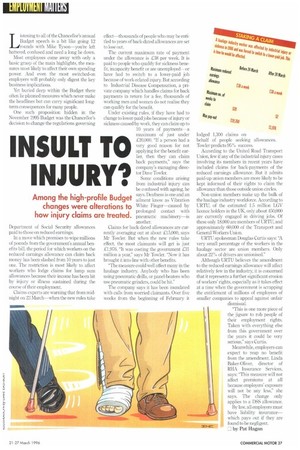INSULT TO INJURY.
Page 39

If you've noticed an error in this article please click here to report it so we can fix it.
Listening to all of the Chancellor's annual Budget speech is a bit like going 12 rounds with Mike Tyson—you're left battered, confused and need a long lie down.
Most employees come away with only a basic grasp of the main highlights, the measures most likely to affect their own spending power. And even the most switched-on employers will probably only digest the key business implications.
Yet buried deep within the Budget there often lie planned measures which never make the headlines but can carry significant longterm consequences for many people.
One such proposition hidden in the November 1995 Budget was the Chancellor's decision to change the regulations governing Department of Social Security allowances paid to those on reduced earnings.
In a move which promises to wipe millions of pounds from the government's annual benefits bill, the period for which workers on the reduced earnings allowance can claim back money has been slashed from 10 years to just one. The restriction is most likely to affect workers who lodge claims for lump sum allowances because their income has been hit by injury or illness sustained during the course of their employment.
Claims experts are warning that from midnight on 23 March—when the new rules take effect—thousands of people who may be entitled to years of back-dated allowances are set to lose out.
The current maximum rate of payment under the allowance is 4:38 per week. It is paid to people who qualify for sickness benefit, incapacity benefit or are unemployed—or have had to switch to a lower-paid job because of work-related injury. But according to Industrial Disease Compensation, a private company which handles claims for back payments in return for a fee, thousands of working men and women do not realise they can qualify for the benefit.
Under existing rules, if they have had to change to lower-paid jobs because of injury or sickness caused by work, they can claim up to 10 years of payments—a maximum of just under £20,000. "If a person had a very good reason for not applying for the benefit earlier, then they can claim back payments," says the company's managing director Dave Towler.
Some conditions arising from industrial injury can be confused with ageing, he says. Deafness is one and an ailment know as Vibration White Finger—caused by prolonged contact with pneumatic machinery—is another.
Claims for back-dated allowances are currently averaging out at about £15,000, says Mr 'Fowler. But when the new rules take effect, the most claimants will get is just £1,976. "It was costing the government ,C31 million a year," says Mr Towler. "Now it has brought it into line with other benefits.
"The measure could well affect many in the haulage industry Anybody who has been using pneumatic drills, or panel-beaters who use pneumatic grinders, could be hit."
The company says it has been inundated with calls from worried claimants. Over five weeks from the beginning of February it behalf of people seeking allowances. Towler predicts 95% success.
According to the United Road Transport Union, few if any of the industrial injury cases involving its members in recent years have included claims for back-payments of the reduced earnings allowance. But it admits paid-up union members are more likely to be kept informed of their rights to claim the allowance than those outside union circles.
Non-union members make up the bulk of the haulage industry workforce. According to URTU, of the estimated 1.5 million WV licence holders in the UK, only about 450,000 are currently engaged in driving jobs. Of these only 18,000 are members of URTU, and approximately 60,000 of the Transport and General Workers Union.
URTU spokesman Douglas Curtis says: "A very small percentage of the workers in the haulage sector are union members. Only about 229.0 of drivers are unionised."
Although URTU believes the amendment to the reduced earnings allowance will affect relatively few in the industry, it is concerned that it represents a further significant erosion of workers' rights, especially as it takes effect at a time when the government is scrapping the entitlement of millions of employees of smaller companies to appeal against unfair dismissal.
"This is one more piece of the jigsaw to rob people of their employment rights. Taken with everything else from this government over the years it could be very serious," says Curtis.
Meanwhile, employers can expect to reap no benefit from the amendment. Linda Baker•Oliver, director of RHA Insurance Services, says: "This measure will not affect premiums at all because employers' exposure will not be any less," she says. The change only applies to a DSS allowance.
By law, all employers must have liability insurance— which pays out if they are found to be negligent.
.L] by Pat Hagan
















































































































